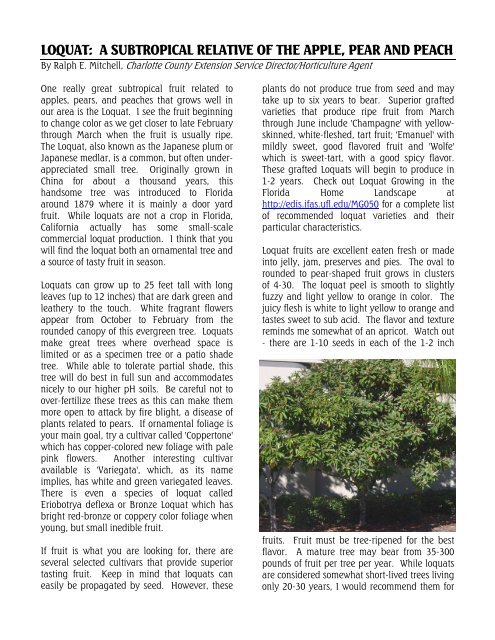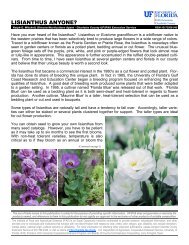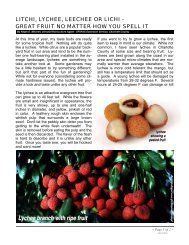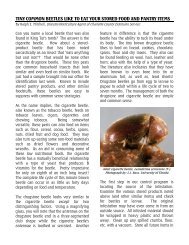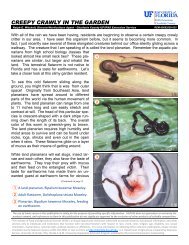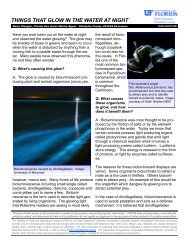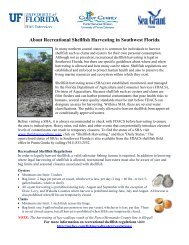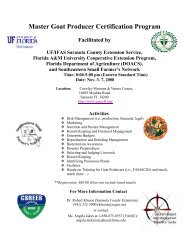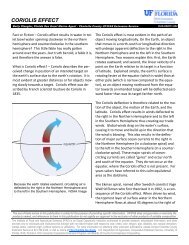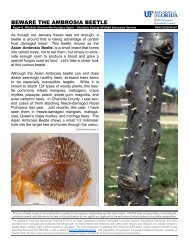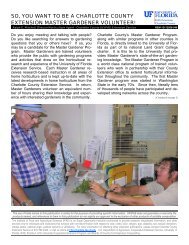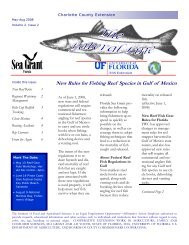Loquat: A Subtropical Relative of the Apple, Pear, and Peach
Loquat: A Subtropical Relative of the Apple, Pear, and Peach
Loquat: A Subtropical Relative of the Apple, Pear, and Peach
Create successful ePaper yourself
Turn your PDF publications into a flip-book with our unique Google optimized e-Paper software.
LOQUAT: A SUBTROPICAL RELATIVE OF THE APPLE, PEAR AND PEACH<br />
By Ralph E. Mitchell, Charlotte County Extension Service Director/Horticulture Agent<br />
One really great subtropical fruit related to<br />
apples, pears, <strong>and</strong> peaches that grows well in<br />
our area is <strong>the</strong> <strong>Loquat</strong>. I see <strong>the</strong> fruit beginning<br />
to change color as we get closer to late February<br />
through March when <strong>the</strong> fruit is usually ripe.<br />
The <strong>Loquat</strong>, also known as <strong>the</strong> Japanese plum or<br />
Japanese medlar, is a common, but <strong>of</strong>ten underappreciated<br />
small tree. Originally grown in<br />
China for about a thous<strong>and</strong> years, this<br />
h<strong>and</strong>some tree was introduced to Florida<br />
around 1879 where it is mainly a door yard<br />
fruit. While loquats are not a crop in Florida,<br />
California actually has some small-scale<br />
commercial loquat production. I think that you<br />
will find <strong>the</strong> loquat both an ornamental tree <strong>and</strong><br />
a source <strong>of</strong> tasty fruit in season.<br />
<strong>Loquat</strong>s can grow up to 25 feet tall with long<br />
leaves (up to 12 inches) that are dark green <strong>and</strong><br />
lea<strong>the</strong>ry to <strong>the</strong> touch. White fragrant flowers<br />
appear from October to February from <strong>the</strong><br />
rounded canopy <strong>of</strong> this evergreen tree. <strong>Loquat</strong>s<br />
make great trees where overhead space is<br />
limited or as a specimen tree or a patio shade<br />
tree. While able to tolerate partial shade, this<br />
tree will do best in full sun <strong>and</strong> accommodates<br />
nicely to our higher pH soils. Be careful not to<br />
over-fertilize <strong>the</strong>se trees as this can make <strong>the</strong>m<br />
more open to attack by fire blight, a disease <strong>of</strong><br />
plants related to pears. If ornamental foliage is<br />
your main goal, try a cultivar called 'Coppertone'<br />
which has copper-colored new foliage with pale<br />
pink flowers. Ano<strong>the</strong>r interesting cultivar<br />
available is 'Variegata', which, as its name<br />
implies, has white <strong>and</strong> green variegated leaves.<br />
There is even a species <strong>of</strong> loquat called<br />
Eriobotrya deflexa or Bronze <strong>Loquat</strong> which has<br />
bright red-bronze or coppery color foliage when<br />
young, but small inedible fruit.<br />
If fruit is what you are looking for, <strong>the</strong>re are<br />
several selected cultivars that provide superior<br />
tasting fruit. Keep in mind that loquats can<br />
easily be propagated by seed. However, <strong>the</strong>se<br />
plants do not produce true from seed <strong>and</strong> may<br />
take up to six years to bear. Superior grafted<br />
varieties that produce ripe fruit from March<br />
through June include 'Champagne' with yellowskinned,<br />
white-fleshed, tart fruit; 'Emanuel' with<br />
mildly sweet, good flavored fruit <strong>and</strong> 'Wolfe'<br />
which is sweet-tart, with a good spicy flavor.<br />
These grafted <strong>Loquat</strong>s will begin to produce in<br />
1-2 years. Check out <strong>Loquat</strong> Growing in <strong>the</strong><br />
Florida Home L<strong>and</strong>scape at<br />
http://edis.ifas.ufl.edu/MG050 for a complete list<br />
<strong>of</strong> recommended loquat varieties <strong>and</strong> <strong>the</strong>ir<br />
particular characteristics.<br />
<strong>Loquat</strong> fruits are excellent eaten fresh or made<br />
into jelly, jam, preserves <strong>and</strong> pies. The oval to<br />
rounded to pear-shaped fruit grows in clusters<br />
<strong>of</strong> 4-30. The loquat peel is smooth to slightly<br />
fuzzy <strong>and</strong> light yellow to orange in color. The<br />
juicy flesh is white to light yellow to orange <strong>and</strong><br />
tastes sweet to sub acid. The flavor <strong>and</strong> texture<br />
reminds me somewhat <strong>of</strong> an apricot. Watch out<br />
- <strong>the</strong>re are 1-10 seeds in each <strong>of</strong> <strong>the</strong> 1-2 inch<br />
fruits. Fruit must be tree-ripened for <strong>the</strong> best<br />
flavor. A mature tree may bear from 35-300<br />
pounds <strong>of</strong> fruit per tree per year. While loquats<br />
are considered somewhat short-lived trees living<br />
only 20-30 years, I would recommend <strong>the</strong>m for
every l<strong>and</strong>scape. <strong>Loquat</strong>s look tropical, are hardy <strong>and</strong> somewhat drought tolerant, <strong>and</strong> provide a tasty<br />
crop <strong>of</strong> fruit on a yearly basis. Late February <strong>and</strong> March starts <strong>the</strong> season for this fruit when few o<strong>the</strong>r<br />
fruits are readily available. Try this tree <strong>and</strong> its tasty fruit this year!<br />
For more information on all types <strong>of</strong> fruit trees <strong>and</strong> o<strong>the</strong>r gardening issues, please contact our Master<br />
Gardeners on <strong>the</strong> Plant Lifeline at 941.764.4340 from 1:00pm-4:00pm Mondays, Wednesdays, <strong>and</strong> Fridays.<br />
Our <strong>of</strong>fice is located at 25550 Harbor View Road, Suite 3, in Port Charlotte. Our Plant Clinics are available<br />
across <strong>the</strong> county:<br />
‣ Demonstration Garden (6900 Florida Streeet, PG) Thursdays 9:00am-11:00am.<br />
‣ Englewood/Charlotte Public Library Thursdays 10:00am-1:00pm.<br />
‣ Mid-County Regional Library 1 st <strong>and</strong> 3 rd Thursday <strong>of</strong> month 1:00pm-3:00pm.<br />
‣ Edison College Learning Resources Library 3 rd Tuesday <strong>of</strong> month 1:00pm-4:00pm.<br />
‣ South Gulf Cove Learning Garden 3 rd Wednesday <strong>of</strong> month 9:00am-12:00pm.<br />
Monthly Plant Clinics are Saturdays 9:00am-12:00pm at <strong>the</strong> following locations:<br />
‣ <strong>Peach</strong>l<strong>and</strong> Promenades Publix 2 nd Saturday <strong>of</strong> month.<br />
‣ Home Depot Murdock & Home Depot Punta Gorda 3 rd Saturday <strong>of</strong> month.<br />
‣ Lowes Garden Center Murdock 4 th Saturday <strong>of</strong> month.<br />
Ralph Mitchell is <strong>the</strong> County Extension Director/Horticulture Agent for <strong>the</strong> Charlotte County Cooperative<br />
Extension Service. You may contact him by email (Ralph.Mitchell@charlottefl.com). You may also contact a<br />
volunteer Master Gardener 1:00pm-4:00pm Monday, Wednesday, <strong>and</strong> Friday at 941.764.4340 or by email<br />
(Master.Gardener@charlottefl.com).<br />
For more information about our Florida Yards <strong>and</strong> Neighborhoods Program, please contact our FYN<br />
Horticulture Program Assistant, Allison Steele, at 941.764.4340. Allison can help educate you about <strong>the</strong><br />
Florida Yards & Neighborhoods Program so that you can create a beautiful, Florida-Friendly l<strong>and</strong>scape that<br />
saves you time <strong>and</strong> money while conserving precious water resources <strong>and</strong> reducing pollution.<br />
Resource:<br />
Gilman, E.F. & Watson, D.G. (2007) Eriobaotrya japonica: <strong>Loquat</strong>, UF/IFAS Extension Service.<br />
Gilman, E.F. & Watson, D.G. (2006) Eriobotrya deflexa: Bronze <strong>Loquat</strong>, UF/IFAS Extension Service.<br />
Gilman, E.F. & Watson, D.G. (2007) Eriobotrya japonica 'Coppertone': 'Coppertone' <strong>Loquat</strong>, UF/IFAS<br />
Extension Service.<br />
Gilman, E.F. & Watson, D.G. (2007), Eriobotrya japonica 'Variegata': 'Variegata' <strong>Loquat</strong> UF/IFAS<br />
Extension Service.<br />
Crane, J.H. <strong>and</strong> Caldeira, M.L. (2006), <strong>Loquat</strong> Growing in <strong>the</strong> Florida Home L<strong>and</strong>scape, UF/IFAS<br />
Extension Service.


